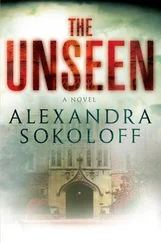Liston happily presided over everyone. “This is really nice,” she said twice. “Don’t you think, guys? We should do this more often,” she mused.
Frequently, though briefly, Ada glanced at William, who slouched in his chair and held his fork with his fist. He looked back at her curiously several times, and once asked her about one of her teachers at Queen of Angels, and she managed a reply, lighthearted enough to satisfy herself.
Toward the end of the meal, Liston told Ada to wait where she was and went into the other room. She brought back with her something clumsily gift-wrapped, an amorphous object concealed behind wrapping paper covered in balloons. “A little welcome present,” said Liston.
When Ada opened it she saw it was a backpack, a simple blue one, exactly the kind she would have chosen if she’d had the chance. It was the kind her classmates owned. It was inconspicuous. It was perfect.
“I’ve seen you carrying all those books to school in your arms,” said Liston. “Out the window, you poor thing.”
“Thank you so much,” said Ada, with as much sincerity as she could muster. But although she was indeed grateful to have it, this token that indicated in some fundamental way that she belonged among her peers, she also sensed the loss of something. Her father’s difference. Her own.
When the dinner was over, Ada returned to her new bedroom and thought of David in his new bedroom, sharing a room with Mr. Gainer, who probably would not even speak to him. She wondered about the state of his mind that night: wondered what he realized, what confused him. He had to feel disoriented, she thought, in his new home, with its linoleum floors and its terrible fluorescent lights.
Suddenly she remembered the piece of paper Sister Katherine had handed her with David’s direct line on it. She opened her suitcase and fished in it for the shorts she had been wearing earlier, and from them she pulled David’s number.
There was no telephone in Ada’s room, but she put her head out into the hallway and, finding it empty, picked up the extension on a nearby table. And dialed.
It was 9:00. Not too late to call, she hoped. The phone rang five times. She began to be worried.
And then, at last, someone answered.
“Hello?” said David. He sounded worried. He sounded unlike himself.
“David,” she said. “It’s me.”
A pause.
“Are you okay?” she asked. “Is everything okay there?” She was speaking quietly to avoid being overheard by any of the Listons.
Still he said nothing.
“David?” said Ada. And then, impulsively, she tried a word she had never used before. “Dad?”
“I’m sorry,” said David. “I don’t know who this is,” he said. And then he hung up the phone.
The following week, Liston put David’s house on the market, where it would stay, she told Ada, for months, perhaps years. It was the 1980s, and houses in Dorchester were slow to sell, even in Savin Hill. The busing controversy of the previous decade had quieted, but it had brought to the surface such unspeakable ugliness and hatred that the city felt somehow altered in its wake. Boston’s molecules had reorganized themselves in a way that felt noticeable and raw. Many of its citizens, mainly working-class and middle-class Bostonians of Irish and Italian descent, had left for the towns to the west and north and south. (“And good riddance,” David had said.) Savin Hill, which felt suburban, even rural in parts, had been largely unaltered, but its residents had become even more firmly tribal, even more convinced that the rest of Dorchester was a place to be avoided. The Globe and the Herald were filled with stories about the violence transpiring in other parts of the city. And when Ada and David used to take long walks in the evening into different neighborhoods, they had once heard gunshots in the distance. Connie Reardon, Liston’s friend in real estate, seemed pessimistic about the home’s odds of selling quickly. Secretly, Ada was glad.
Liston said that the two of them had to go through the house together, begin to sort out David’s possessions, but she was tired every day after work, and every weekend she said nothing at all about it. Her new position as head of the lab meant that she sometimes went in on weekends; the rest of her free time she wanted to spend with her boys. Ada said nothing either. She was happy to leave everything just as it was, a museum about her life with David.
Her after-school visits to David at St. Andrew’s replaced her after-school visits to David at the lab. When school ended for the summer, Ada went back to a semblance of her former life, spending every day with David. Some mornings she even returned to the lab with Liston; other days she spent all day at St. Andrew’s. She became well known to Sister Katherine and Patrick Rowan and to all the others, the high school girls who sat sentry at the front desk — one of whom she recognized from Queen of Angels, though neither of them ever acknowledged this fact — the nurses who cared for all of the residents.
The changes in David came quickly at times and slowly at others. Her research had prepared her: there would be good days and bad. She attempted, sometimes, to explain the literature she’d studied to David, hoping that to discuss the disease scientifically would bring a measure of comfort to him, would make him feel less disoriented, but by that time he was typically unable to follow long stories or monologues, and halfway through he often interrupted with something pleasant but unrelated, an aside about a nearby bouquet or the sunny weather. Other times their visits were marred by his bad temper, which came on more and more frequently. No , he said, over and over again, outside of any context, with an adamancy that made her feel as if she had done something incorrect. He wagged his head slowly back and forth, adopting the demeanor of someone who had been badly wronged. And then other visits were nice: hazy, pleasant reminders of what had been, David lodging funny complaints, sometimes too loudly, about one or another resident as the two of them strolled down a hallway (“A terrible thief,” he would say, or “That cantankerous, terrible fool”); or good-naturedly praising the staff (“She’s my favorite,” he’d say, within earshot of a nurse — and then the same about another nurse at the end of another hallway); or complimenting the desk attendants on their attire, simply to have something kind to say. When he was in these moods, Ada told him about the lab, and what Liston was working on, and Hayato, and Frank. If Liston, when she visited, repeated the same information, it didn’t matter: David nodded along in the same abstracted way.
Liston’s new role as lab director had brought with it a new set of responsibilities and concerns. She was now in charge of procuring a large percentage of the funds for their research through federal grants; her presence was newly required at a number of institutional meetings each month with administrators at the Bit to advocate for the needs of the lab. She oversaw the interviewing and placement of grad students and the coordination of everyone’s schedule.
“I tell you, Ada,” said Liston, after several months of filling this role, “I have a whole new respect for your father.”
But her new and busier schedule also meant that she was home later in the evening, left earlier each day. From living with David, Ada was used to helping with the management of a household, and so she did what she could to take on some of Liston’s responsibilities.
She also made it her responsibility to keep David’s disease at bay, as much as she possibly could. Each summer day that she spent inside the air-conditioned buildings of St. Andrew’s she treated as an opportunity to keep David’s mind engaged. She came armed with new exercises for him to complete, new experiments in brain stimulation that she had carefully culled from the literature. She tried crossword puzzles with him. Mnemonic devices. She had him memorize lists of words and attempt to repeat them back to her five minutes later. Dutifully, sadly, he participated; but she soon found that each session left him slump-shouldered and low, and so, reluctantly, she stopped.
Читать дальше












